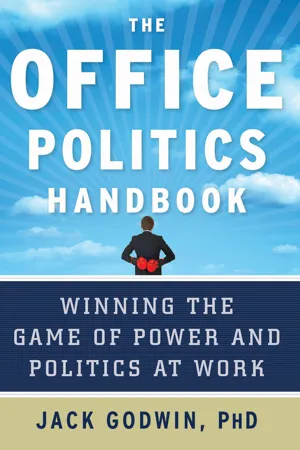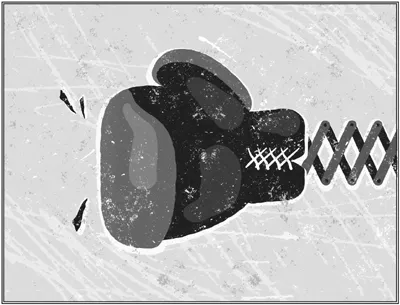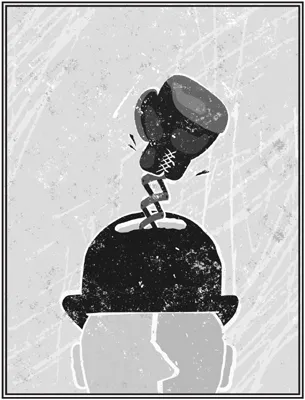![]()
Part I
Defining the Art
![]()
Chapter 1
The Political Animal
Every part, brain and body, nerve tissue and fiber, was keyed to the most exquisite pitch; and between all the parts there was a perfect equilibrium or adjustment. To sights and sounds and events which required action, he responded with lightninglike rapidity.
He perceived and determined and responded in the same instant. In point of fact the three actions of perceiving, determining, and responding were sequential; but so infinitesimal were the intervals of time between them that they appeared simultaneous.
Life streamed through him in splendid flood, glad and rampant, until it seemed that it would burst him asunder in sheer ecstasy and pour forth generously over the world.
—Jack London, Call of the Wild (1903)
This book is for people who dislike power games, but who also recognize that politics takes place wherever there are people: between supervisors and employees, teachers and students, parents and children, and among friends, partners, and spouses. Politics takes place in every country and every culture. It takes place in formal and informal situations and in all kinds of organizations: governments, corporations, academic and religious institutions, and households.
Fortunately, there is no monopoly on power in our modern society, but a diverse “power market” of sorts (imperfect and inefficient and irrational though it is) where individuals and institutions compete with one another for a share of power. If you would like to have more power in your life and greater participation in decision-making on a human scale—with your boss, coworkers, friends, or family members—then keep reading because this book will help shift the balance of power in your favor. If you were asking yourself why you bought this book, now you know. After all, who among us has not been party to an altercation that ended badly, and then replayed the scene in our heads thinking what we could have said and done differently?
There is a mystique to politics, which gives special significance to power, the acquisition of power, and the distribution of power.1 This mystique goes down to the very foundations of human life and satisfies our most basic instincts for power, freedom, and security. Generations may come and go. Entire nations may emerge and disintegrate in a few decades. Political leaders may take control and reign supreme, for a while, until opposing forces and competing influences push the status quo out of equilibrium again. Naturally, new leaders come to power. Naturally, opposition factions resist and the cycle begins again. Thus, power is distributed and redistributed in accordance with the laws of politics.
Other scholars may disagree, but through it all I see no evidence that human nature has changed (meaning improved or moved forward). I say this despite countless cultural developments, discoveries, inventions, and technologies unknown to our ancestors, and hundreds of years of so-called progress.2 These novelties always seem more important in the moment, the same way events in close proximity seem more important than events far away. Although this tendency certainly leaves the impression that recent events are more important than historic events, I believe our long journey out of the cave has had little or no effect on our human nature. This is not because human nature is dead or dormant, but because it is complete. When I say complete, I do not mean perfect. Human nature is primitive, instinctive, occasionally decent, and often repulsive. However, this idea of completion calls for objectivity and realism on our part if we are to understand human nature, not just the average but the outer limits, the dark side and the brightness. We all have our share of human nature, and therefore, we all have the potential and capacity for politics. To dispute this is to disregard the conditions of your own nature. No one—no man or woman—can escape this essential constraint.
Within this constraint, however, there is still room to maneuver. This gap may be smaller than the head of a pin and the interval may last no more than a second, but it is manageable. This is where you should concentrate your attention and energy, not denying your humanity but getting acquainted with it and taking account of your political instincts. Disregarding these conditions—the potential and capacity for politics—will not protect you. You must recognize your human nature so you can recognize it in others. This is critical in life and in the office for dealing with friends and adversaries alike, for minimizing politics in relationships and defending yourself when necessary.
Where do we begin? First, I should say this book is a declaration of independence as well as a doctrine of interdependence. Why? Politics is interactive and responsive, and thus requires you to get up close with your adversary. There is a difference between theory and practice, a difference between reading about politics and physically experiencing the results of your actions. It takes a special skill to stay objective when you are in the thick of it, even when events you initiated are unfolding just as you hoped and expected. Fortunately, this is a skill you can cultivate.
To ensure objectivity and realism on our part, our understanding of politics must begin with the individual, but we cannot leave it there. Any understanding of politics based entirely on the individual would be incomplete. Therefore, we must venture inward, toward your personal psychology, outward into the space between us all, and downward toward the basic elements of human nature. Politics is an interpersonal situation, which by definition requires at least two people interacting, taking cues from and responding to one another in an ongoing spiral of give and take.3
Activities such as eating or sleeping, for example, are natural but not necessarily social. Sexuality may or may not be as strong an instinct as politics, but politics is similarly always a social behavior requiring at least two participants. Political animals are power-seekers whose success depends on convincing or neutralizing those who are resistant or indifferent. If there are power-seekers who minimize other goals in their lives for the sake of power, there are also power-yielders who relinquish power because they put a premium on other values.
The Space Between Us All
Disneyland was about an hour away from where I grew up in Southern California and my family visited the park every year or so. One of my favorite rides was Monsanto’s Adventure thru Inner Space. It was located in an area of the park called “Tomorrowland,” which in those days showcased an idealized (and corporatized) vision of the future. Adventure thru Inner Space opened in the late 1960s but eventually closed to make way for a new Star Wars ride. While it was open, it was more than a ride: It was truly an adventure.
Inner space—as opposed to outer space—was the subatomic world. The idea of Adventure thru Inner Space was to shrink you down so you could actually see the world at the subatomic level. You began by entering a giant microscope, which was a little frightening because you could see the riders in front of you—now miniaturized—exiting the microscope. You kept shrinking, first smaller than snowflakes, then smaller than the crystals of a snowflake until you were small enough to pass through the snowflake’s walls and actually see water molecules. You kept shrinking and shrinking until you could fit inside an atom. Time practically stood still as elementary particles bounced off one another in slow motion. After that, you began growing back to normal size until you reemerged from your Adventure thru Inner Space into the bright sunlight.
If we could take an adventure through political inner space, could we see the fundamental structure of politics from the inside? What if we stripped away all the dynasties and conquests, all the governments, political parties, and factions, and reduced politics down to the essentials? Would we see people bumping into one another the way protons and neutrons collide? Surely this would not be random. Surely, there is order at some level even if it all appears random to the untrained eye. Think about nuclear energy for a moment. In nuclear fission, the nucleus breaks apart and releases a tremendous amount of energy. In nuclear fusion, smaller particles combine to form a larger nucleus, which also releases a tremendous amount of energy. This is politics at the elementary level: the interpersonal level. The more closely we study politics at this level, the more we will discover what powerful forces come from the smallest sources.
All politics is local. You have probably heard this quotation, which is attributed to Tip O’Neill, former speaker of the House of Representatives during Ronald Reagan’s White House years.4 The term is synonymous with retail politics, which means campaigning door to door and canvassing potential voters one at a time. In common usage, “retail” means selling goods and services to individual consumers. The consumer is the end-user and has no intention of reselling to anyone else. Retail politics also has a pejorative connotation—buying votes—but this is not what I mean. I am referring to the personal interaction between power-seekers and power-yielders. This interaction is an exchange analogous to microeconomics, except it deals with individual political units instead of individual economic units.
If you position yourself at this level, you get an idea of where micropolitics takes place. For the student and practitioner of micropolitics, this is the Archimedean Point—where you would stand if you wanted perfect objectivity uncorrupted by cultural or emotional influences. (It was Greek mathematician Archimedes who claimed he could move the Earth if only he had a big enough lever and a place to stand.) The Archimedean Point is imaginary and unattainable, which makes it the ideal metaphor for the workbench of micropolitics.5
Now, standing at this workbench, please focus your attention on the space between us all. This space is any kind of formal or informal social situation, wherever there are people who are interdependent and where the distribution of power is asymmetrical. In the workplace, the best example of this would be the formal meeting, with everyone gathered around a big conference table. Everyone knows these meetings are a waste of time. However, if you apply a political standard instead of, let’s say, a productivity standard, the conference room is transformed into a political space and the meeting into an arena where people compete for power and prestige.
When you consider micropolitics, you would be well advised to set aside your spatial presumptions because the physical geography of micropolitics is very small—sometimes the width of a conference table, sometimes no more than the space between two dancers. Micropolitics is dynamic, interactive, responsive, and intimate. This is where you should look because this is where micropolitics comes to life.
When you know where micropolitics takes place, you know where to build your workbench, and where to set your toolbox while you read and play the field. This is the term—the field—that French sociologist Pierre Bourdieu used to describe the space where social interaction takes place. For Bourdieu, the field was a social space with its own structure, its own rules, and its own autonomy.6 However, the social space Bourdieu wrote about isn’t all that interesting to me (speaking as a political scientist) until the moment power is introduced, because that’s the moment the social space becomes political. As I said at the beginning, politics is any social situation in which power is introduced. Power is the concept that makes political science distinct from sociology, psychology, and all other social sciences.
A long time ago, I had a professor in college who said there were only two things in life worth doing. One was making love. The other was making distinctions. This well-rehearsed line always drew an enthusiastic response from a lecture hall full of undergraduate students. When I speak of power, I am not just talking about controlling other people in your organization. I am also referring to your autonomy, your liberty, and of course your self-mastery. This is the distinction. Your autonomy feeds your soul in time of trouble. It gives you a sense of detachment and a new perspective, an Archimedean point of view, which insulates you from cultural or emotional influences. And it gives you leverage; not the kind that lets you move the world but the kind that lets you see the world. It gives you the priceless gift of insight. You can use this insight to make distinctions. Most people see the difference between good and evil. Fewer can make subtler distinctions, such as those pertaining to the laws of micropolitics, which we will discuss in Chapter 2.
It may seem trivial, but making distinctions is what lets you be in the world but not of the world, and gives you the kind of detachment you see in a forensic pathologist or medical examiner (ME). In those popular crime-scene-investigator shows on television, invariably there is a scene in the ME’s lab with a corpse lying on the examination table. The ME lists the contents of the deceased’s stomach: partially digested pepperoni pizza, cherry Coke, and cheesecake. It would be nice if micropolitics worked this way; it would be most advantageous to have the ME’s cool scientific detachment. Unfortunately, your political adversaries will not lay down long enough for you to do a post-mortem, which means you have to read the field, list the alternative courses of action, consider the consequences of inaction, and then make your move all in the span of a few moments. (This requires good timing and self-mastery, which we will cover in Chapter 4.) How do you recognize your adversaries at work? They could be anyone. Throw out the organization chart and ask yourself, Who exercises veto power over my decisions? Who opposes or obstructs me, directly or indirectly? Who competes with me for resources or recognition? You may not like the answers, but you must ask nonetheless.
Politics Is Serious Play
Why do we so often associate politics with game-playing? In The 48 Laws of Power, American author Robert Greene claims repeatedly that power is a game. You may find the urge to play inter-office political games irresistible and you may consider yourself the ultimate realist because of your skillful manipulation of people in your organization. However, I think most people who play political games lack self-discipline and have no idea of the consequences of their actions. They may succeed in hurting or humiliating their adversaries but are almost certainly hurting themselves in the process. In any case, please don’t waste your time with this kind of game-playing.
Richard Chadwick, my mentor at the University of Hawaii, had an idea he called The Deficit Theory of Education. Here is Chadwick’s no-nonsense explanation: “Psychologists have weak egos, mathematicians can’t add, anthropologists don’t understand culture, sociologists are generally from ‘out groups,’ political scientists have power hang-ups, and so on. The deficit is something they value and see themselves as having less of than they want or need. Fear of not overcoming that deficit is their motivation.”7 The main difference between those who make a lasting contribution to their chosen field (eliminating the deficit) and those who do not, is that contributors transform their motivation into play, then transform their play into serious purpose, while those who cannot or will not transform their motivation search for some form of revenge on the world. (Batman’s nemesis, the Joker, for example, or Superman’s nemesis, Lex Luthor.)
The difference has to do with the distinction between ordinary play and serious play. Ordinary play may require imagination and creativity; it may help you learn important social skills and society’s informal rules and expectations. All of this is invaluable. But serious play serves a purpose. Serious play requires persistence toward a goal. The distinction between ordinary versus serious play is analogous to the distinction between seduction and courtship: To seduce is to mislead; to court is to woo. When you court someone, you are trying to earn their love, not fool them. If you took a snaps...



